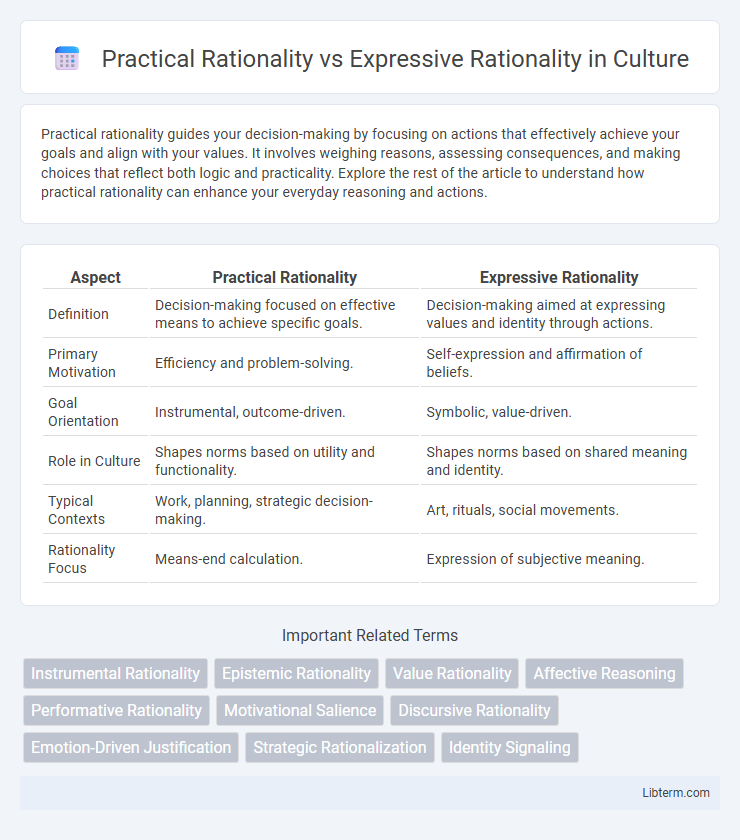Practical rationality guides your decision-making by focusing on actions that effectively achieve your goals and align with your values. It involves weighing reasons, assessing consequences, and making choices that reflect both logic and practicality. Explore the rest of the article to understand how practical rationality can enhance your everyday reasoning and actions.
Table of Comparison
| Aspect | Practical Rationality | Expressive Rationality |
|---|---|---|
| Definition | Decision-making focused on effective means to achieve specific goals. | Decision-making aimed at expressing values and identity through actions. |
| Primary Motivation | Efficiency and problem-solving. | Self-expression and affirmation of beliefs. |
| Goal Orientation | Instrumental, outcome-driven. | Symbolic, value-driven. |
| Role in Culture | Shapes norms based on utility and functionality. | Shapes norms based on shared meaning and identity. |
| Typical Contexts | Work, planning, strategic decision-making. | Art, rituals, social movements. |
| Rationality Focus | Means-end calculation. | Expression of subjective meaning. |
Understanding Practical Rationality
Practical rationality centers on decision-making guided by reason to achieve specific goals or outcomes, emphasizing effective action in real-world scenarios. It involves assessing circumstances, weighing alternatives, and choosing strategies that best fulfill one's objectives based on available information. This form of rationality prioritizes instrumental reasoning and adaptive problem-solving to navigate complex environments efficiently.
Defining Expressive Rationality
Expressive rationality refers to decision-making driven by the desire to express identity, emotions, or group affiliation rather than by instrumental or practical goals. This form of rationality prioritizes symbolic values and social meanings, influencing choices that reinforce self-concept or social bonds. It contrasts with practical rationality, which focuses on optimizing outcomes based on objective calculations and efficiency.
Core Differences Between Practical and Expressive Rationality
Practical rationality centers on decision-making aimed at achieving specific goals through logical reasoning and efficient problem-solving, often relying on empirical evidence and cost-benefit analysis. Expressive rationality, however, emphasizes the articulation and reinforcement of personal or social identity, values, and beliefs, prioritizing emotional and symbolic expression over objective outcomes. The core difference lies in practical rationality's focus on instrumental outcomes versus expressive rationality's focus on self-expression and group affiliation.
Real-World Examples of Practical Rationality
Practical rationality involves decision-making based on achieving specific goals through efficient and effective means, exemplified by a project manager allocating resources to meet deadlines and budget constraints. In real-world scenarios, investors employ practical rationality by diversifying portfolios to maximize returns while minimizing risk. This approach contrasts with expressive rationality, which prioritizes actions that express individual identity or values over instrumental outcomes.
Expressive Rationality in Everyday Life
Expressive rationality in everyday life emphasizes actions driven by personal values, emotions, and social identity rather than instrumental goals. This form of rationality is observable in choices that prioritize authentic self-expression and communal belonging, such as participating in cultural rituals or advocating for social causes. Understanding expressive rationality helps explain behaviors that practical cost-benefit analyses fail to capture, revealing the significance of meaning and identity in human decision-making.
Psychological Foundations of Rational Decision-Making
Practical rationality in decision-making emphasizes goal-oriented actions based on logical evaluation of available information and outcomes, grounded in cognitive processes such as problem-solving and cost-benefit analysis. Expressive rationality prioritizes decisions that affirm individual identity, emotions, and social values, reflecting psychological motives like self-expression and social belonging. Understanding these psychological foundations highlights the dual influences of instrumental reasoning and affective factors shaping rational behavior in diverse contexts.
How Social Context Influences Rationality
Social context significantly shapes practical rationality by directing decision-making towards achieving tangible outcomes aligned with societal norms, expectations, and resources. Expressive rationality, influenced by social context, emphasizes actions that communicate identity, values, or group membership, prioritizing symbolic coherence over efficiency. Interactions within social networks and cultural frameworks determine which form of rationality prevails in various situations, reflecting collective beliefs and social incentives.
Practical Rationality in Policy and Governance
Practical rationality in policy and governance emphasizes decision-making grounded in empirical evidence, tangible outcomes, and measurable benefits to society. This approach prioritizes efficiency, feasibility, and the alignment of policies with real-world constraints and stakeholder interests to achieve optimal public welfare. By focusing on actionable solutions and iterative evaluation, practical rationality ensures responsive and adaptive governance that addresses complex social challenges effectively.
The Impact of Expressive Rationality on Group Dynamics
Expressive rationality influences group dynamics by prioritizing identity affirmation and emotional resonance over instrumental problem-solving, leading to cohesive but potentially polarized groups. This form of rationality reinforces in-group beliefs and values, often intensifying conflicts with out-groups and reducing openness to contradictory evidence. Consequently, decision-making within groups driven by expressive rationality may emphasize symbolic expression rather than practical effectiveness.
Balancing Practical and Expressive Rationality in Modern Society
Balancing practical rationality, which emphasizes efficient decision-making based on objective criteria, with expressive rationality, centered on personal values and identity expression, is crucial for navigating modern societal complexities. Incorporating both forms allows individuals and institutions to achieve functional outcomes while honoring authentic self-expression and cultural diversity. Modern social frameworks benefit from integrating pragmatic solutions with emotional and symbolic significance to foster inclusive and adaptive communities.
Practical Rationality Infographic

 libterm.com
libterm.com